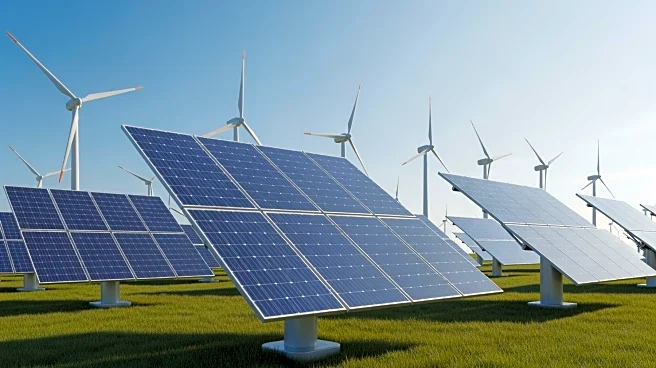What's Happening?
The cleantech revolution is increasingly being led by countries not dominated by the oil and gas industry, according to a recent analysis. While the United States has contributed significantly to cleantech advancements,
such as solar cell and battery inventions, its status as a petrostate has hindered progress. The fossil fuel industry in the U.S. has been influential in blocking cleantech initiatives, with political leaders often reversing advancements in electric vehicles (EVs) and renewable energy. In contrast, China and Europe are making significant strides, with China seeing 32% of new car sales being fully electric. These regions are not controlled by oil and gas interests, allowing them to accelerate their leadership in cleantech. The article also notes that petrostates like Russia, Saudi Arabia, and the U.S. are unlikely to lead in cleantech due to entrenched oil interests.
Why It's Important?
The shift in cleantech leadership away from petrostates has significant implications for global energy markets and environmental policy. Countries like China and those in Europe are setting the pace for electric vehicle adoption and renewable energy integration, potentially influencing global standards and practices. This transition could reduce the global dependency on oil, impacting economies heavily reliant on fossil fuels. The delay tactics by petrostates in international negotiations, such as those at the International Maritime Organization, highlight the ongoing struggle between traditional energy powers and emerging cleantech leaders. The ability of non-petrostates to lead in cleantech could accelerate global efforts to combat climate change and reduce greenhouse gas emissions.
What's Next?
As China and Europe continue to lead in cleantech, other countries may follow suit, reducing their reliance on oil and gas. This could lead to a more diversified global energy market, with increased investment in renewable technologies. The ongoing negotiations at international forums, such as the IMO, will be crucial in determining the pace of global cleantech adoption. Countries not dominated by oil interests may push for more aggressive climate policies, potentially leading to a shift in global energy dynamics. The resistance from petrostates, however, suggests that the transition may face significant political and economic challenges.
Beyond the Headlines
The cleantech revolution represents a broader shift in global power dynamics, where countries not reliant on fossil fuels can exert greater influence in international policy. This could lead to ethical and cultural changes, as societies move towards more sustainable practices. The long-term implications include potential shifts in geopolitical alliances, as energy independence becomes a strategic priority. The cultural embrace of cleantech could also lead to changes in consumer behavior, with increased demand for sustainable products and services.










